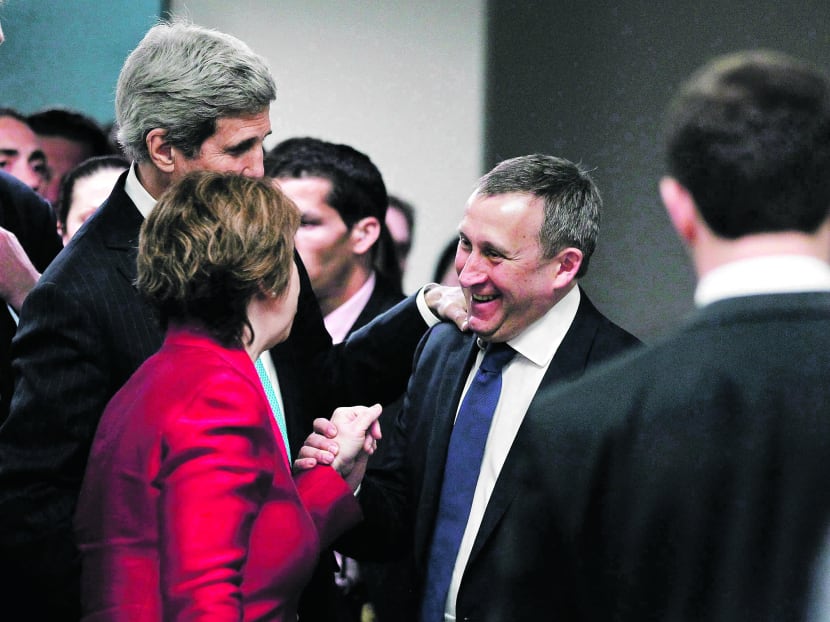US, EU warn Russia of sanctions if progress on agreement not made
GENEVA — After four-way talks on the crisis in Ukraine produced an accord aimed at de-escalating the conflict, United States officials and their European allies warned that Russia must help produce results in days or face new sanctions.

Ukrainian Foreign Minister Andriy Deshchytsia (right) thanking US Secretary of State John Kerry and EU High Representative Catherine Ashton for the results of a quadrilateral meeting on Thursday. Photo: Reuters
GENEVA — After four-way talks on the crisis in Ukraine produced an accord aimed at de-escalating the conflict, United States officials and their European allies warned that Russia must help produce results in days or face new sanctions.
“If we’re not able to see progress on the immediate efforts, to be able to implement the principles of this agreement this weekend, then we will have no choice but to impose further costs on Russia,” US Secretary of State John Kerry told a news conference in Geneva on Thursday, in reference to further European Union and US sanctions.
The Geneva agreement — hammered out during six hours of talks by Mr Kerry, Russian Foreign Minister Sergey Lavrov, interim Ukrainian Foreign Minister Andrii Deshchytsia and Catherine Ashton, the foreign policy chief for the EU — called on all sides in Ukraine to refrain from violence or provocative behaviour and rejected all forms of intolerance, including anti-Semitism.
“All illegal armed groups must be disarmed,” the joint statement said. “All illegally seized buildings must be returned to legitimate owners; all illegally occupied streets, squares and other public places in Ukrainian cities and towns must be vacated.”
In exchange, the interim Ukrainian government agreed to grant amnesty to protesters who leave the government buildings they have occupied and give up their arms, unless they are suspected of murder or capital crimes.
The Kiev government would also ensure that constitutional revisions involve “outreach to all of Ukraine’s regions and political constituencies”, a reference to Russian speakers in the eastern part of the country.
But the agreement was as notable for what it did not address as for what it did. It did not require Russia to remove its troops from the border, nor did it commit Moscow to hold direct talks with Ukrainian officials, two of US President Barack Obama’s demands. Moreover, the agreement made no mention of Russia’s seizure and annexation of Crimea, an action deemed unacceptable by the US and Europe but yet unlikely to be reversed, at least in the foreseeable future, as Western officials have acknowledged privately.
“None of us leave here with the sense that the job is done,” Mr Kerry said afterward. “We do not envision this as the full measure of de-escalation.”
But he called the measures an important first step to avert “a complete and total implosion” in eastern Ukraine and said they could lead to more far-reaching moves to resolve the conflict.
In response to a question, Mr Kerry insisted that the US had not dropped its objections to Russia’s annexation of Crimea but acknowledged that it had not been the focus of the meeting. “We didn’t come here to talk about Crimea,” he said.
Mr Obama said Ukraine’s government presented a “detailed and thorough presentation” of overhauls it would make and went “out of its way to address a range of the concerns” expressed by Russians. Now, it was time for Russia to “use the influence that they’ve exerted in a disruptive way” to give Ukraine a chance to hold elections and stabilise its economy.
But Mr Lavrov put the onus on the authorities in Kiev, saying the deal was “largely based on compromise” and that a broader settlement of the crisis was primarily Ukraine’s responsibility. AGENCIES






